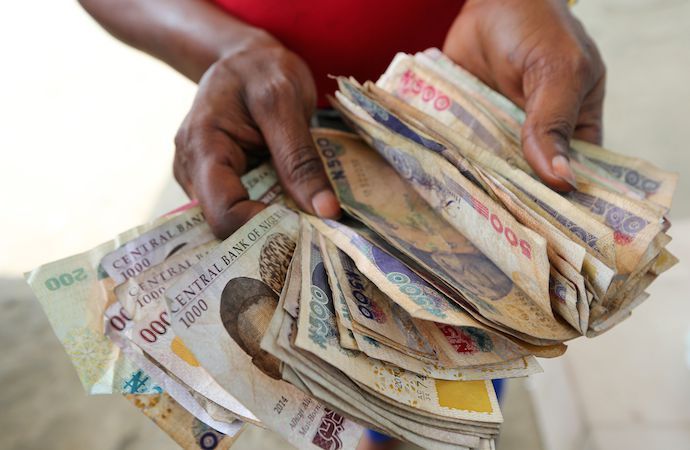
Reports that the exchange rate between the naira and the US dollar closed at N416.67/$1 at the Investors and Exporters (I&E) window, where forex is traded officially.
Naira retracted as it depreciated by 0.16% against the US dollar to close at N416.67/$1 compared to N416/$1 recorded in the previous trading session. Demand for dollar at the official window has witnessed consecutive declines in the past 3 trading sessions.
On the other hand, Naira remained flat at the parallel market, trading at N570/$1 on Monday, 14th February 2022. This is according to information obtained from BDC operators interviewed by Nairametrics.
Also, Nigeria’s external reserve dropped further on Friday, 11th February 2022 to close at $39.85 billion. Representing a 0.06% decline compared to $39.87 billion recorded as of the previous day. The reserve continues despite the upward trend in the price of crude oil, already trading above $95 per barrel and edging closer to hitting the $100 per barrel mark.
The exchange rate at the Investors and Exporters window closed at N416.67/$1 on Monday, 14th February 2022, which represents a 0.16% depreciation compared to N416/$1 recorded in the previous trading session.
The crypto market started trading activities on Tuesday on a positive note with the industry gaining over $53 billion in the early hours of the day to stand at $1.91 trillion. The movement in the industry market capitalization is largely attributable to the bullish sentiment in the two most valuable crypto assets, Bitcoin and Ethereum.
As of press time, crypto flagship asset, Bitcoin had gained 2.72% to trade at $43,697, while Ethereum had gained 3.89% to trade at $3,044.47. In the same vein, Solana gained 5.33% to trade at $101.65, Terra gained 2.12% to trade at $54.9818931, while Uniswap recorded a 2.64% gain to trade at $10.9.
Meanwhile, Kristalina Georgieva, the managing director of the International Monetary Fund (IMF), has stated that crypto assets and stablecoins are no match for well-designed central bank digital currencies (CBDCs).
“If CBDCs are designed prudently, they can potentially offer more resilience, more safety, greater availability, and lower costs than private forms of digital money,” she stated.
Meanwhile, the U.S. Securities and Exchange Commission (SEC) announced on Monday that crypto lending platform BlockFi has agreed to pay $100 million in penalties. According to the commission, it charged Blockfi Lending LLC with failing to register the offers and sales of its retail crypto lending product, BlockFi Interest Accounts (BIAs).
The crude oil market resumed trading activities on Tuesday morning on a bearish note, following a stellar growth recorded yesterday having surpassed $96 per barrel and heading towards a $100 per barrel milestone.
However, the market retracted on Tuesday morning as Brent Crude dipped by 0.63% to trade at $95.87 per barrel, while West Texas Intermediate (WTI) dipped 0.71% to trade at $94.78. Natural gas however gained 3.53% on Tuesday morning to trade at $4.343 per barrel while gasoline recorded a 0.56% decline to trade at $2.764 per barrel.
The market had remained bullish in recent weeks owing to sustained tension between Russia and Ukraine. Meanwhile, the foreign minister of Ukraine, Dmytro Kuleba said that Russia had ignored formal requests to explain the build-up of 100,000 soldiers on Ukraine’s borders. Although, Russia had denied any plans to invade Ukraine despite the build-up of troops at the border, according to BBC.
Meanwhile, the price of OPEC Basket declined marginally by 0.02% to trade at $92.85 per barrel, four days ago, While Bonny Light gained 1.48% to close at $95.97 a barrel. Nigeria’s crude products, Brass River and Qua Iboe followed the same path with a 4.8% appreciation to close at $98.74 per barrel.
Nigeria’s external reserve declined by 0.06% on Friday, 11th February 2022 to close at $39.85 billion, which represents a decline of $22.74 million from the $39.87 billion recorded as of the previous day.
The continuous decline in the country’s reserve level can be attributed to the Central Bank’s intervention in the official market in ensuring the stability of the exchange rate. Although it is worth noting that the decline has been very minimal in recent times, largely attributable to the rally in crude oil prices.
Nigeria’s reserve level declined by $481.37 million in January 2022 following the $66.17 million depreciation recorded in the previous month. Meanwhile, year-to-date, Nigeria’s reserve has now depreciated by $671.4 million despite the rally at the global crude oil market.
Rice, a staple for Christmas celebrations in Nigeria, has become a luxury this year. Soaring…
Panic erupted on Saturday at a concert in Lagos when the stage collapsed during Odumodublvck’s…
The Federal Government of Nigeria has allocated ₦6,364,181,224 billion for the refurbishment and rehabilitation of…
The black market dollar to naira exchange rate for today, 22nd December 2024, can be…
The Nigerian National Petroleum Company Limited (NNPCL) has refuted claims that the 60,000 barrels per…
Manchester City finds itself in unprecedented turmoil, with relegation-level form showing little sign of improvement.…